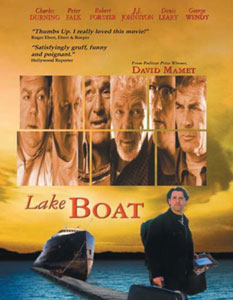“Lakeboat” (2000) is an odd duck among David Mamet’s catalog. Written by Mamet based on his own play and directed by his friend Joe Mantegna, it came out at the height of his filmmaking powers, but it smacks of an unfinished, low-budget production. The trailer is sloppy, and the film is shot in 4:3 aspect ratio as if for television, even though it was not a TV release.
Low-budget and rushed
The post-production feels cheap and rushed. A rendition of “Beyond the Sea” – on the nose and overused, but perhaps the film’s biggest expenditure – opens the proceedings. Bob Mamet’s score consists of a motif similar to “Crazy Ex-Girlfriend’s” “West Covina, California” that opens each segment of the film, split into three summer months.
Despite feeling like an abandoned project in these ways, “Lakeboat” is surprisingly enjoyable. A top-notch cast of actors, many of whom must’ve worked for less than their standard rates, shines at delivering dialog Mamet adapts from his earliest stage play, first written in 1970 and then rewritten and first produced in 1980.

“Lakeboat” (2000)
Director: Joe Mantegna
Writer: David Mamet
Stars: Charles Durning, Peter Falk, Denis Leary
College student Dale (Mamet’s half-brother Tony) takes a gig as the cook and janitor for a giant cargo hauler that launches from Chicago for the summer (in more or less present day, based on the references, but the time doesn’t matter).
“Lakeboat” has no plot, although we get some connective tissue via everyone’s imaginings of what happened to Dale’s predecessor, Guigliani (Andy Garcia), who disappeared after going to a Chicago bar. There’s also no protagonist; although Tony Mamet is good as the Everyman, his arc is simple and obvious: Dale thinks he’s in for a horrible summer but ends up making good friends among the capital-C Characters on this veteran seafaring crew.
(And also, if you know this is based on David Mamet’s real-life experience and want to go the meta route, this is the story of him being inspired to go write “Lakeboat.”)
Series of conversations
The film is a series of vignettes via the crew members conversing with Dale, all of which connect with viewers by having Mametspeak that sings (“Who do I have to f*** to get a sandwich?!”), some of which connect by being insightful slices of life.
While the topics lean slightly toward things men – especially of older, less-PC generations – will say to other men when there are no women around, “Lakeboat” isn’t a crass film on its whole. Robert Forster particularly stands out as Joe, who seems to hope Dale will have a happier life than he has had (although this isn’t a melancholy film on the whole, either).
Some vignettes are as simple as J.J. Johnston’s Stan and Jack Wallace’s Fred arguing about the merits of Steven Seagal films – the type of topics that would be uninteresting except if they’re peppered with Mametspeak. Charles Durning, Peter Falk, Denis Leary and George Wendt fill out the cast and mostly get material worthy of their talents.

Overall, we do get sharp insight into the nature of this job – well, not the job itself, but the experience of living among a crew who says “f***” at a rate to match their level of boredom, as Joe explains.
Mantegna’s direction is workmanlike, and he adds a subtle, methodical sway to the boat scenes. He delivers a worthy portrayal of Mamet’s high-seas summer job. And then, I’m guessing, he ran out of money for post-production and marketing. Nonetheless, Mamet fans should definitely check this out as an example of his early writing, and even casual fans might enjoy “Lakeboat” as a trifling but entertaining study of colorful characters.

